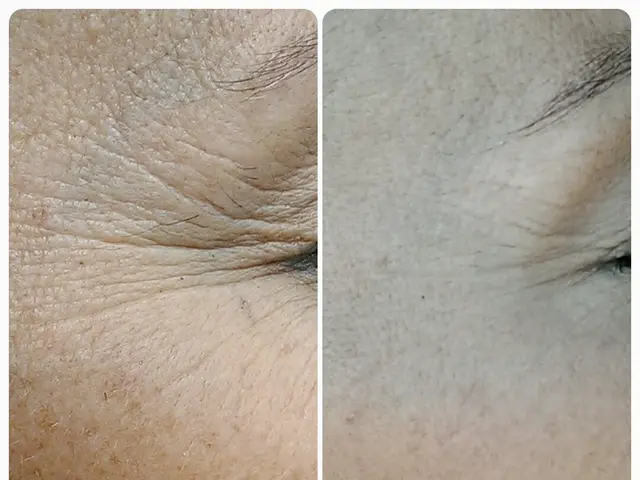Exploring Strategies for Managing C3 Glomerulopathy (C3G) Disease
C3 Glomerulopathy, a Rare Kidney Condition: Current Treatment and Emerging Therapies
C3 Glomerulopathy (C3G) is a rare condition affecting around 2 to 3 people per million. This kidney disorder leads to protein deposits in the filtering tissues, impairing their function and potentially causing kidney failure over time. As there is no cure for C3G, treatment focuses on strategies to support kidney function and suppress the immune system.
Origins of C3G
C3G originates from an overactive immune system, particularly due to genetic changes causing an imbalance in the body's complement system, part of the immune response. This system becomes overactive in C3G, leading to an excess of C3 protein and subsequent deposits in the kidneys.
Diagnosis and Symptoms
Symptoms of C3G can vary, but typically include protein in the urine (proteinuria), high blood pressure, and decreased kidney function. Diagnosis requires a kidney biopsy, which reveals the telltale C3 deposits.
Current Treatment Approaches
For C3G treatment, doctors employ strategies to support kidney health and suppress the immune system. Current approaches include:
- Angiotensin converting enzyme (ACE) inhibitors and angiotensin receptor blockers (ARBs): These medications lower blood pressure and can help prevent protein leakage into the urine.
- Mycophenolate mofetil (MMF) and glucocorticoids: These immunosuppressive medications are recommended once a person has declined kidney function for at least 6 months, or if there are signs of the condition progressing.
- Complement inhibitors: These medications, such as eculizumab and ravulizumab, aim to slow down kidney damage by stopping complement system activity. Doctors may suggest these medications if traditional immunosuppressant medications prove ineffective.
Emerging Treatments
Researchers are studying new treatments that target different parts of the complement system to interrupt the events leading to C3G activity. Some promising medications include pegcetacoplan, iptacopan, avacopan, and KP104, among others. These treatments aim to prevent damage to the kidneys by either disabling C3 or its associated proteins.
Future Outlook
With the emergence of these new treatments, there is hope for better management and potential cures for C3G. Ongoing clinical trials are evaluating these and other complement inhibitors to optimize long-term outcomes in this rare kidney disease.
References
- Kidney Disease: Improving Global Outcomes (KDIGO) organization clinical guidelines for managing C3G
- Primary immunodeficiency UK C3G guidelines
- American Society of Nephrology C3G guidelines
- National Institutes of Health's National Institute of Diabetes and Digestive and Kidney Diseases C3G resources
- National Kidney Foundation C3G information and resources
Note: If relevant, integrate some findings from the Enrichment Data to provide additional insights into the current and emerging treatment options for C3G.
During the progression of C3 Glomerulopathy (C3G), certain genetic changes can cause imbalances in the body's complement system, a part of the immune response. This overactive system leads to an excess of C3 protein and harmful deposits in the kidneys.
The management of C3G emphasizes supporting kidney health and suppressing the immune system. Current treatments involve the use of Angiotensin converting enzyme (ACE) inhibitors and angiotensin receptor blockers (ARBs), which aim to support kidney health and reduce protein leakage into the urine. In addition, doctors may recommend Mycophenolate mofetil (MMF) and glucocorticoids, particularly when there are signs of the condition worsening or if kidney function has declined for at least 6 months. Emerging treatments, such as eculizumab and ravulizumab, aim to supplement current strategies by slowing down kidney damage by decreasing the activity of the complement system.
Findings from the research realm include innovative treatments that specifically target different parts of the complement system, intending to interrupt the processes that trigger C3G activity. Examples of these potential therapies are pegcetacoplan, iptacopan, avacopan, KP104, and others, which either block C3 or inhibit its associated proteins to prevent kidney damage.
While emerging treatment options offer hope for improved management and possible cures for C3G, ongoing clinical trials are crucial in evaluating complement inhibitors to achieve optimal long-term outcomes in those affected by this rare kidney disease.
Individuals seeking further insights into the current and emerging treatment options for C3G may find the following resources helpful:
- Kidney Disease: Improving Global Outcomes (KDIGO) organization clinical guidelines for managing C3G
- Primary immunodeficiency UK C3G guidelines
- American Society of Nephrology C3G guidelines
- National Institutes of Health's National Institute of Diabetes and Digestive and Kidney Diseases C3G resources
- National Kidney Foundation C3G information and resources
Additional information on eye health, mental health, family health, and numerous other health topics can be found in resources like health-and-wellness, fitness-and-exercise, sexual-health, and nutrition, among many others. Many health concerns, such as autoimmune disorders, chronic diseases, cancer, cardiovascular health, respiratory conditions, digestive-health, skin-care, and sensory health (including hearing), require proactive and informed approaches.
Those navigating health challenges with aging, weight management, psoriasis, or medicare, may find support in dedicated resources and communities. Parenting resources abound to help families manage children's health needs and provide necessary guidance. In all cases, seeking expert medical advice to ensure proper care and understanding of one's health is essential.
Beyond medicine, wellness extends to various aspects of life. Some practices, like mindfulness, therapy, and alternative treatments like CBD, may contribute to overall well-being and stress reduction. Neurological disorders and skin conditions can also benefit from targeted therapies and treatments.








